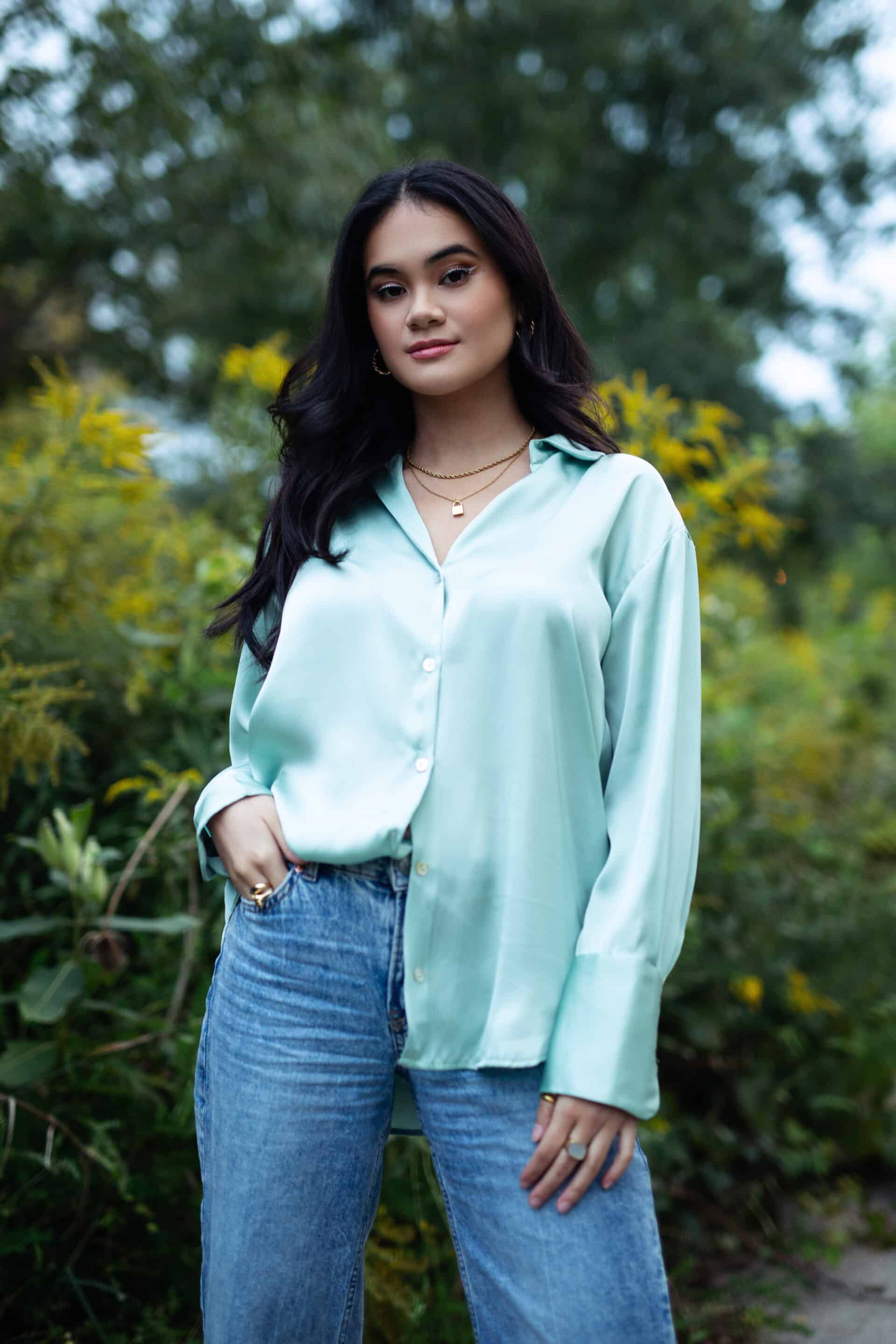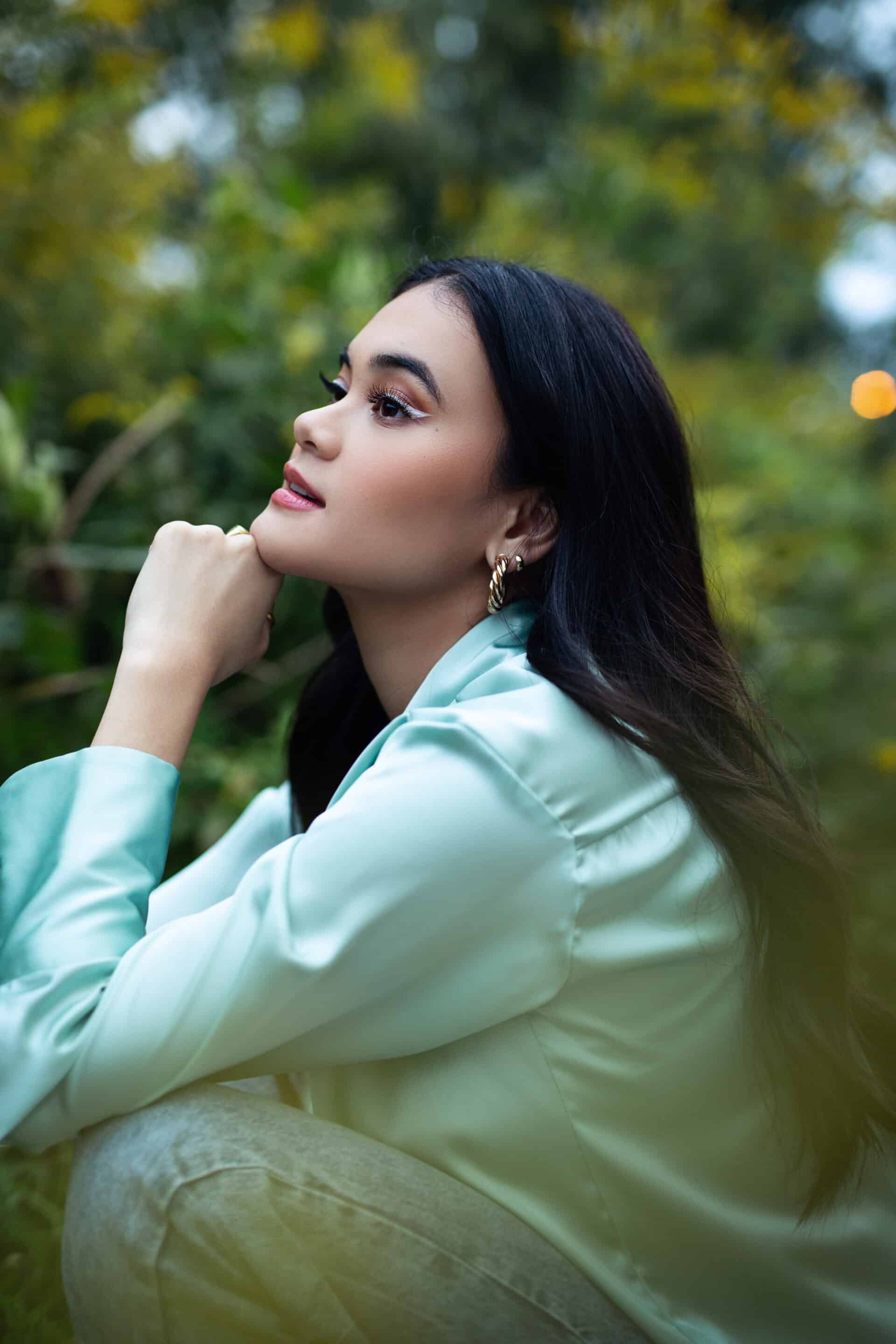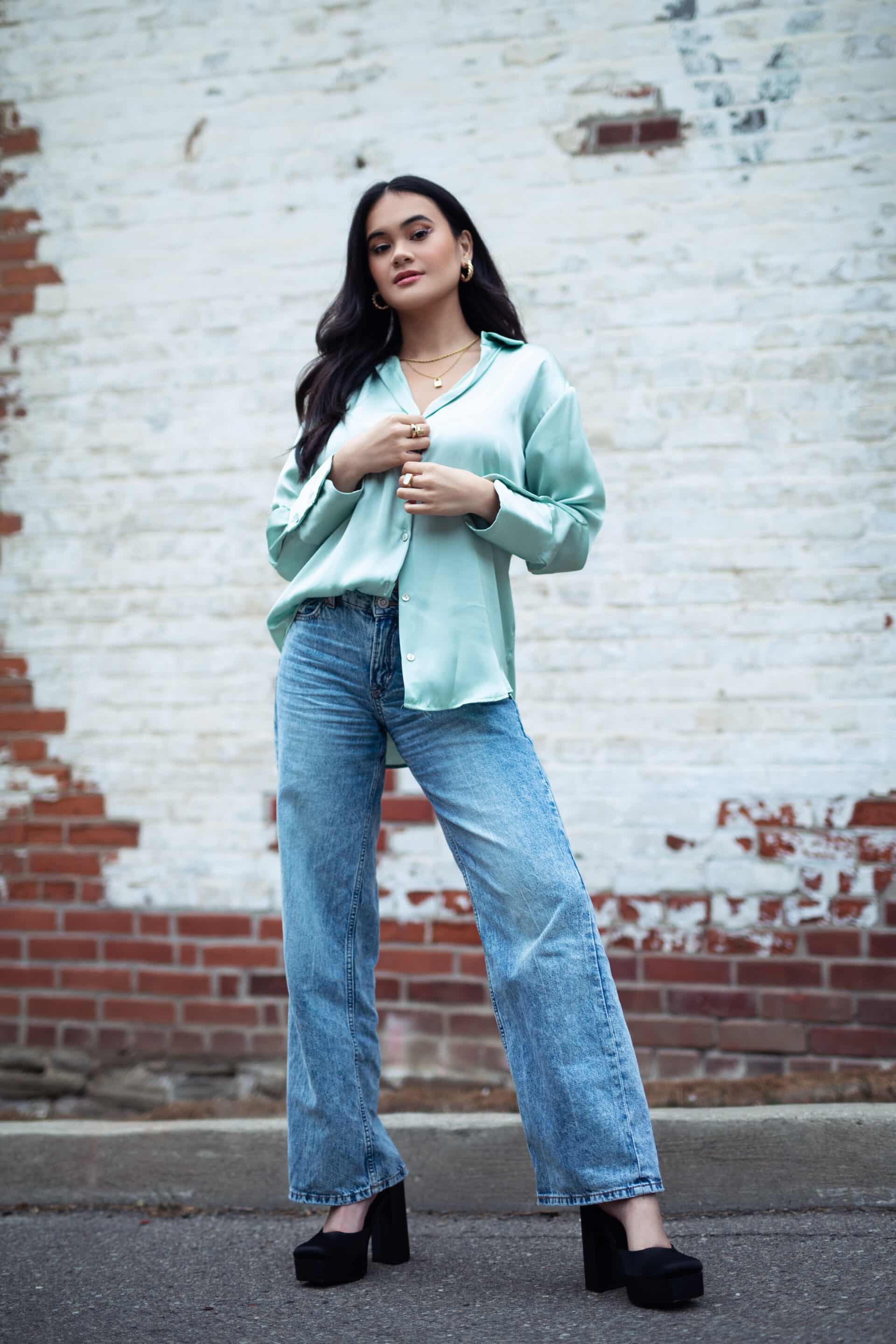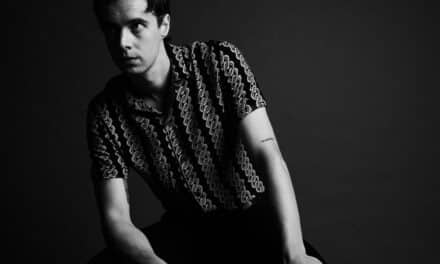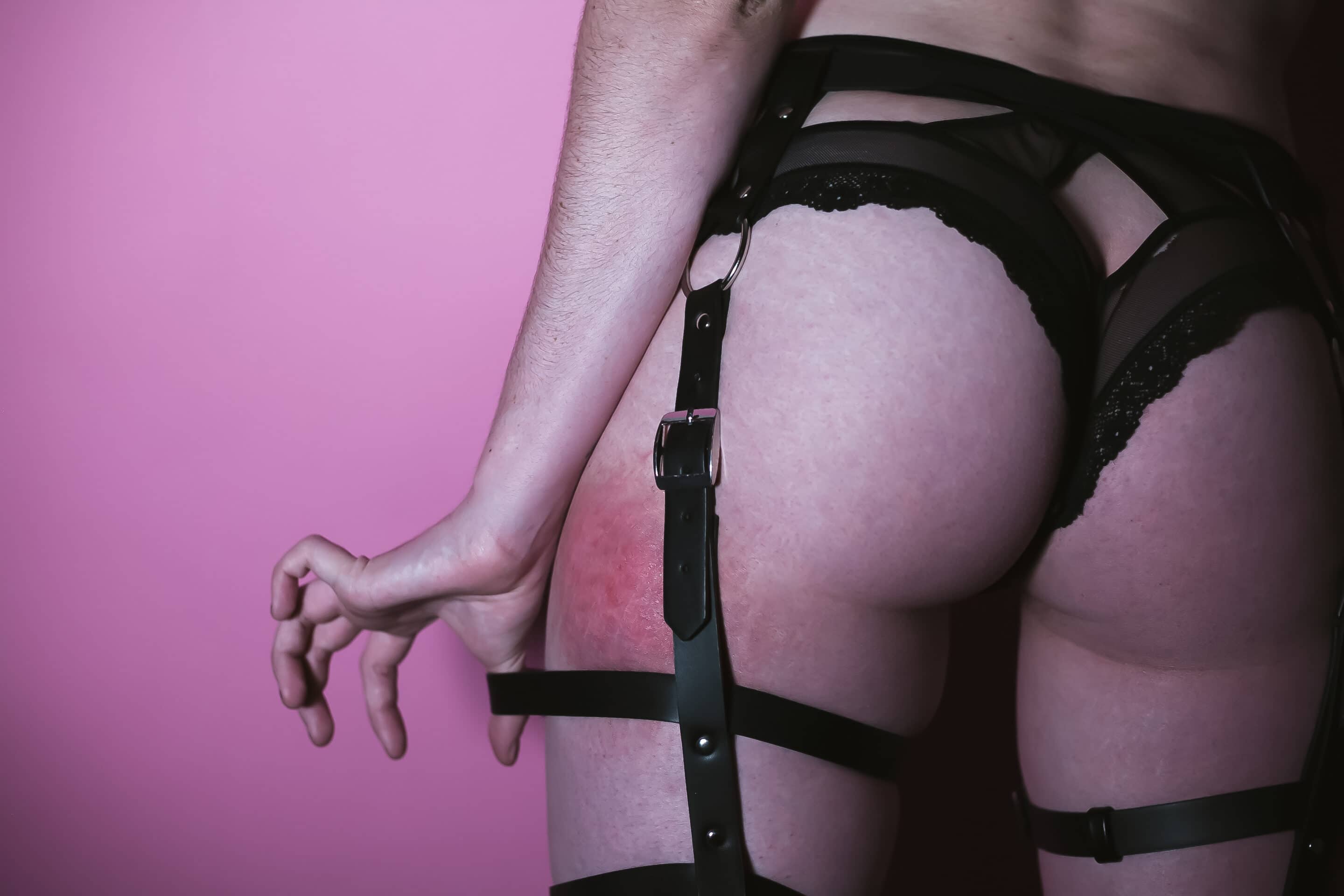Photographer Rodney Campos
If you haven’t heard of Martina Ortiz Luis yet, you’re about to. The Canadian actress and powerhouse vocalist—best known to TV audiences as Rachel Valdez on Wynonna Earp—is making her big-screen musical debut in Briarcliff Entertainment’s Juliet and Romeo, a modern twist on Shakespeare’s most infamous love story. The first film in a planned movie-musical trilogy, it hits theaters May 9 in the U.S., with a UK release following on June 11.
Martina plays Veronica, a key figure in the reimagined Verona, and she gets a star-making showcase with an original number staged in the town square—a moment that blends theatrical bravado with pop accessibility. The single, written specifically for her voice, will drop the same day the film opens. Sharing the screen with Rebel Wilson, Derek Jacobi, and Jason Isaacs, Martina doesn’t just hold her own—she shines.
From Arena Anthems to Shakespearean Streets
Martina’s story is the kind that feels like a movie musical itself. At 15 years old, she became the first official anthem singer for the Toronto Maple Leafs, performing at Scotiabank Arena for six seasons straight. She studied at the prestigious Cardinal Carter Academy for the Arts, pursued classical vocal performance at the University of Toronto, and somehow found time to join the cast of Wynonna Earp in its award-winning fourth season—launching her screen career on an international scale.
Now, she juggles stage and screen with enviable ease. When she’s not filming or in the studio, she’s performing eight shows a week as part of Disney’s The Lion King at Toronto’s historic Princess of Wales Theatre. Her latest single, “Mad At Myself,” offers a glimpse of her pop sensibilities—polished yet vulnerable, carrying that magnetic “stage-to-studio” energy that makes her voice instantly recognizable.
Juliet and Romeo: A New Take on an Old Heartbreak
The film itself reimagines the tragedy through a modern lens, leaning into spectacle and song to reintroduce Shakespeare’s star-crossed lovers to a new generation. For Martina, the experience was more than a role—it was a full-circle artistic moment. “Getting to perform an original number that was written for my voice was surreal,” she shares. “It let me combine my love for acting and singing in a way I’ve always dreamed about.”
Between the soaring original soundtrack, the stylish visual language, and the all-star ensemble cast, Juliet and Romeo positions itself as a love letter to theater kids, pop music fans, and anyone who ever thought Shakespeare could use a bit more groove.
Beyond the Stage Lights
Martina is the kind of artist whose creative energy doesn’t turn off when the curtain falls. When she isn’t performing, she’s writing, reading, and quietly building her own stories. With music, television, theater, and now film under her belt, she’s poised to become one of those rare multi-hyphenates who can leap from stage to screen to studio effortlessly.
For now, she’s inviting audiences to step into her world—starting with a walk through the streets of a very musical Verona. And for anyone who’s ever wondered who the next big voice in musical film might be, Martina Ortiz Luis is ready to answer.
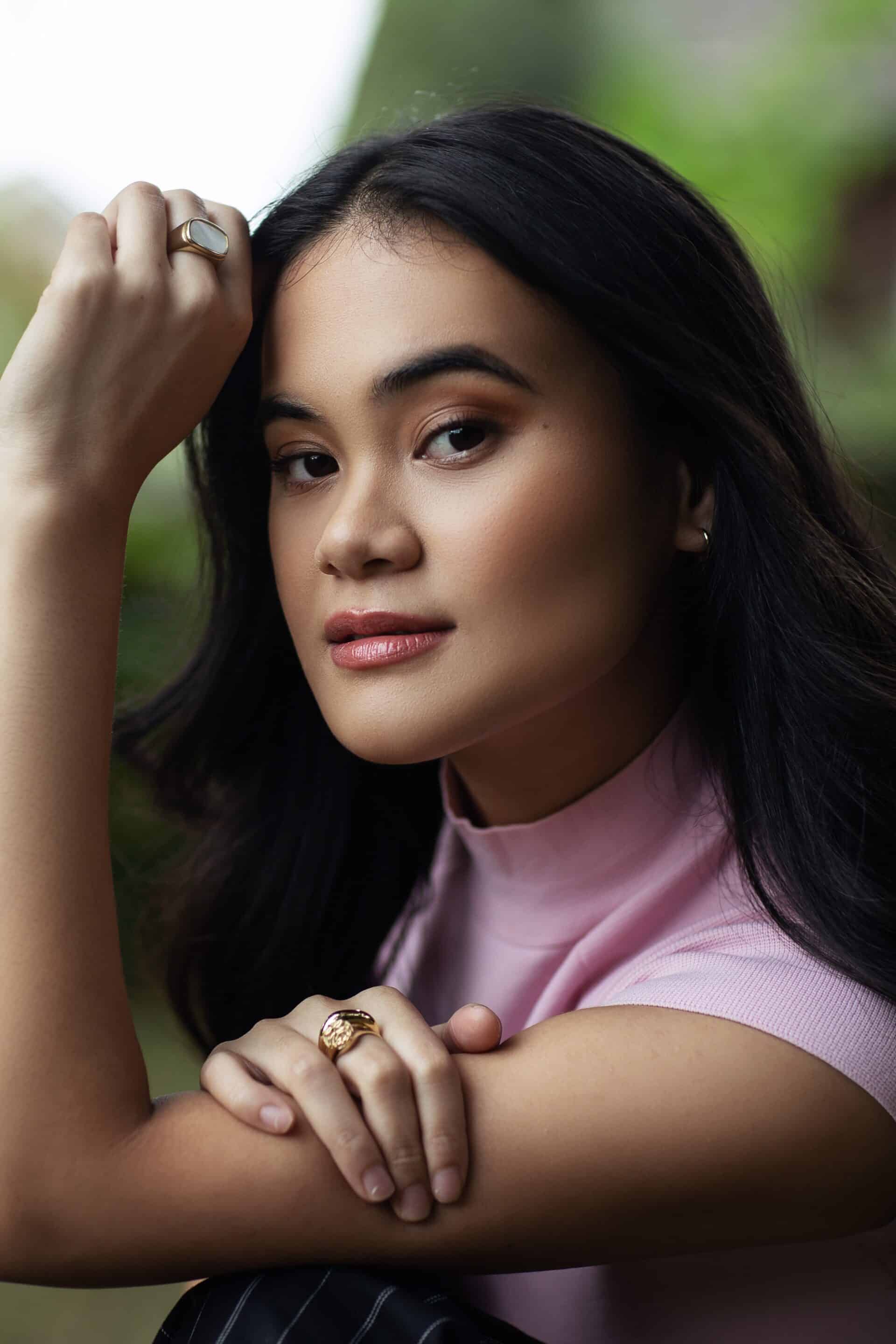
Photographer Jordan Harvey
Let’s start with your role in *Juliet and Romeo*. What can you tell us about Veronica, and how did it feel to bring this original character to life in such an iconic reimagining of Shakespeare’s story?
Veronica was a lot of fun. She works at what we call “The Iron Horse” where all the Montague boys like to hang out and get into all sorts of trouble. She’s deeply in love with Mercutio, though they both struggle to face their class differences. It was honestly very liberating to bring this new character, who doesn’t exist in Shakespeare’s original text, to life and to see where she fits into this world. She’s a performer, she’s passionate, she’s bold, she gets some really cool musical numbers throughout the film, and it was just an absolute joy to play her.
You perform a powerful musical number in the town square—an original song written just for you. What was the process like preparing for that performance, and how did it challenge you vocally and emotionally?
Yeah that was very cool. “Better Than This” is such a catchy and energetic number. It was honestly the first track that really stuck with me after hearing the full demo of the soundtrack for the first time. So much heart and hard work went into making that scene what it is. We began with choreo rehearsals and recording sessions in Rome, and then moved on to film the sequence in the stunning medieval town of Castell’Arquato.
Shooting there just felt like stepping into a fairytale world, but it definitely came with some unique challenges. We were dressed in full period costumes, including these delicate leather shoes, trying to navigate uneven cobblestone streets in freezing temperatures with snow, rain, and also all at night. It was definitely a physical and mental challenge. The number itself is packed with energy – between our fantastic dancers, background actors, and the chaos stirred up by the Montague and Capulet boys, there was just a lot to coordinate. I actually came down with a pretty nasty cold during the shoot, but I’d say that in the end, it was so worth it. It’s a dynamic moment in the film, and I really hope audiences enjoy it.
Juliet and Romeo* is packed with star power—Rebel Wilson, Derek Jacobi, Jason Isaacs. What was it like working alongside such a dynamic cast? Any standout moments on set you can share?
Truly an honour and a dream come true. We were all staying at the same hotels and because we were on mostly night shoots, when we’d wake up to go to work or when we’d come back from work, nothing around was ever open for us to go grab a bite or drink at except for our hotel lobby. There were many nights shared in those lobbies altogether and singing around the piano. But an especially cool moment for me was, one of the days I was off, I decided to go visit set just to shadow and observe (I just love watching the filmmaking process from any POV I can) and that particular day they were filming Derek Jacobi doing his reprise to the song “I Should Write This Down” which was essentially a rap. Never in my life did I think I’d get to witness the Sir Derek Jacobi rapping a song live in front of me. That was pretty epic. Unfortunately, I don’t think it made it into the film itself but it’s definitely part of the full soundtrack which is available on Spotify and all that fun stuff. Go give it a listen!
You’re no stranger to the stage, currently starring in *The Lion King* at Toronto’s Princess of Wales Theatre. How does performing live 8 shows a week inform or contrast with your work on film?
In my personal experience, performing eight shows a week has definitely been more physically demanding. Every moment of the show, on and off stage, you’re fully engaged. I’m singing, moving, and on my feet for hours at a time, six days a week, sometimes with extra rehearsals in the week. But there’s something about that consistency and repetition that I think allows you to deepen your performance over time. You build stamina, refine choices, and discover new layers, all of which can definitely inform and strengthen your work on screen.
TV and film, on the other hand, come with their own challenges. The workdays are much, much longer, but the actual time and flow of performing is often broken up with rehearsals, blocking, and resetting for coverage. You usually get a few takes to land a moment you’ve spent so much time preparing, and you won’t even really know how the whole scene reads or what specific performance the audience gets to see from you until it’s gone through editing. It requires a different kind of precision and trust. That said, the overall approach to the work doesn’t change too drastically between mediums in that it always starts with preparation, rehearsal, and care. What shifts is the scale. On screen, your relationship with the camera is incredibly intimate – the smallest gesture can carry. On stage, especially in a space as grand as the Princess of Wales Theatre, and in a production as larger-than-life as The Lion King, your performance needs to reach every seat in that theatre. The heart of the work stays the same, but you’re constantly adapting your delivery to make the storytelling as effective as possible.
Your journey has been impressive—from studying classical vocal performance to becoming the first official anthem singer for the Toronto Maple Leafs at just 15. How do you think those early experiences shaped your artistry?
Thank you! Yes, studying classical music early on definitely taught me a lot about discipline, how to practice, bring a piece to life, and use my voice as an instrument to tell a story, and in a way that’s healthy, so I’m not straining or hurting myself. Which is so important especially when you’re performing regularly.
I started performing publicly at a young age, but singing the anthems for the Leafs, in an arena of that size, really pushed me to grow. Singing in front of thousands of people every other night, I think taught me how to stay focused under pressure, and helped really build my confidence in my ability to show up and perform no matter what’s happening around me. All of that still informs how I work today. Whether I’m on stage, on set, or in the studio, those early lessons are always with me.
Fans loved your performance as Rachel Valdez in *Wynonna Earp*. What was it like transitioning from a genre TV series to a vibrant movie musical—and how do those roles differ in what they demand from you as an actor?
It was actually really exciting! Both Wynonna Earp and Juliet & Romeo have this fun, campy energy to them – and funny enough, I experienced filming both in freezing temperatures. One in the chinooks of Calgary, and the other in various little ancient towns in Northern Italy. And both projects required its actors to be very active and on their feet.
Wynonna was my first major TV role, so a big part of that experience was just learning how everything works on set, finding my footing, and stepping into a show that already knew itself, the pace, the world and the strong fanbase. Being in the sci-fi/supernatural/fantasy world, there were also a lot of backstory elements to keep on top of, and just technically, sometimes reacting to things that weren’t necessarily there (yet) while still keeping the performance natural and grounded.
One of the challenges with Juliet & Romeo was figuring out how to bring all the musical numbers to life in a way that still felt grounded in the story, which was such a cool creative process to be part of. I’d never been in a period piece before, so I had to figure out the physicality required to do choreography on cobblestone streets in corsets and leather shoes without looking as uncomfortable or stiff as I might’ve felt. With Juliet & Romeo, I learned so much. I think every project will teach you something new, and this project definitely brought about its own challenges, but this time I felt way more comfortable being on set, especially having worked on other things in between the two. I had a better sense of the rhythm of filming, and on top of that, I got to do something that felt really familiar, singing in front of a large crowd and performing.
You’ve also just released a new single, ‘Mad At Myself’. How does your solo music reflect who you are creatively right now, and how does it differ from the music we hear in your theatrical roles?
It’s just me not taking myself too seriously, experimenting, and having fun. It differs from my acting roles, in that it’s not informing any set story or character but my own.
You’ve worked in so many different formats—TV, film, theater, music. Do you see yourself leaning more into one of those in the future, or is the balance part of what fuels your creativity?
Right now, I can say the balance is what truly fuels my creativity because it is all storytelling in different forms. You can transform and exercise different parts of yourself. It keeps the challenge and discovery going. However currently, as I’m coming off this almost year-long journey with Disney’s “The Lion King”, I’m excited to get back into the film/TV world and to have more time to hopefully work on more original music as well.
There’s a strong narrative in ‘Juliet and Romeo’ about rewriting the past and reclaiming identity. Was there anything about this theme that resonated with you personally or artistically?
The idea of rewriting the past resonated with me in a very specific way. I don’t believe we can, or should, truly erase or rewrite one’s past. But we can build upon it. Coming from an immigrant household, sometimes it felt like I was being brought up in two different environments. The one shaped by my family’s values and histories formed in a different cultural context than the other that they sought out so that I could shape a different life, a different future. I grew up with the weight and beauty of stories that came before me – of resilience, sacrifice, and strength. It’s sacred. I often think of my own story as standing on their shoulders – my parents’, my grandparents’ – and building on top of that foundation they gave me.
In that sense, reclaiming and embracing identity isn’t about rejecting where I come from. It’s about honouring it while also making space for the parts of myself that are shaped by a different world. “Juliet & Romeo” truly echoed that for me, the idea that we can acknowledge the stories we inherited while daring to imagine new ones in our own voice.
You’ve been building your career from a young age—acting, singing, performing at major venues. What advice would you give to other young artists trying to find their voice in such a competitive industry?**
Be yourself, trust your gut, know that you’re allowed to say “no”, know how to take a “no”, believe in yourself, and work hard for what you want.
 Photographer Jordan Harvey
Photographer Jordan Harvey